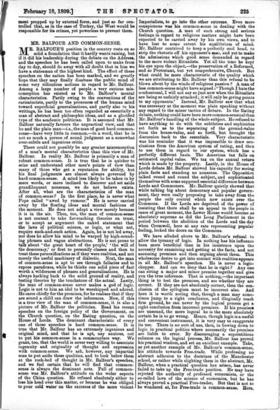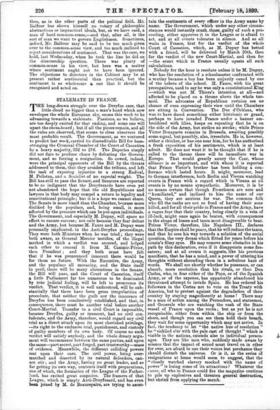MR. BALFOUR AND COMMON-SENSE.
R. BALFOUR'S position in the country rests on so solid a foundation that it hardly wants raising, but if it did his leadership during the debate on the Address, and the speeches he has been called upon to make from day to day, should do away with all doubt that in him we have a statesman of the highest kind. The effect of these speeches on the nation has been marked, and we greatly hope that they may finally disabuse the public mind of some very ridiculous notions in regard to Mr. Balfour. Among a large number of people a very curious mis- conception has existed as to Mr. Balfour's mental characteristics. Partly owing to the conventions of the caricaturists, partly to the proneness of the human mind toward superficial generalisations, and partly also to his writings, he has been too often regarded as essentially a man of abstract and philosophic ideas, and as a glorified type of the academic politician. It is assumed that Mr. Balfour naturally favours the unpractical view, and that he and the plain man—i.e., the man of good hard common- sense—have very little in common,—in a word, that he is not so much a person of sound judgment as a somewhat over-subtle and ingenious critic.
There could not possibly be any greater misconception of a man's mental characteristics than this view of Mr. Balfour. In reality Mr. Balfour is primarily a man of robust common-sense. It is true that he is quicker to seize and understand other men's points of view than many of those who get a reputation for ability, but his final judgments are almost always governed by hard common-sense. A mind less likely to be taken in by mere words, or more inclined to discover and set aside grandiloquent nonsense, we do not believe exists. After all, what are the characteristics of the man of common-sense ? In the first place, he is never what Pope called " awed by rumour." He is never carried away by the floating ideas and mental fashions of the moment. He does not adopt a view merely because it is in the air. Then, too, the man of common-sense is not content to take far-reaching theories on trust, or to accept as argument the naked statement that the laws of political science, or logic, or what not, require such-and-such action. Again, he is not led away, nor does he allow his mind to be warped by high-sound- ing phrases and vague abstractions. He is not prone to talk about the great heart of the people,' the will of the democracy,' or first to personify classes and then to treat these personifications as if they were realities, and not merely the useful machinery of dialectic. Next, the man of common-sense is apt to see through fallacies and to expose paradoxes, while he thinks one solid piece of fact worth a wilderness of phrases and generalisations. He is always harking back to the solid ground of reality, and testing theories by the touchstone of the actual. Lastly, the man of common-sense never makes a god of logic. Logic is not to him an idol to be worshipped and adored. He cares chiefly for the premises, for he realises that if they are sound a child can draw the inferences. Now, if this is a true view of the man of common-sense, it is also a picture of Mr. Balfour the politician. Read his recent speeches on the foreign policy of the Government, on the Church question, on the Rating question, on the House of Lords. The dominant characteristic of every one of those speeches is hard common-sense. It is true that Mr. Balfour has an extremely ingenious and original mind, and that he is apt, nay anxious, not to put his common-sense in a commonplace way. We grant, too, that the world is never very willing to associate ingenuity and originality of thought and expression with common-sense. We ask, however, any impartial man to put aside these qualities, and to look below them at the rock-bed of thought in Mr. Balfour's speeches, and we feel certain that he will find that common- sense is always the dominant note. Full of common- sense was Mr. Balfour's attitude on the wider aspects of the China question. He refused absolutely either to lose his head over this matter, or because he was obliged to pour cold water on the excesses of the more violent Imperialists, to go into the other extreme. Even more conspicuous was his common-sense in dealing with the Church question. A man of such strong and serious feelings in regard to religious matters might have been expected to be carried away by his own views, and to have lost to some extent his equilibrium of mind. Mr. Balfour contrived to keep a perfectly cool head, to strip the rhetoric off his opponent's ease, and yet to make the admissions which good sense demanded in regard to the more violent Ritualists. Yet all the time he kept his eye upon the object,—the preservation of a Reformed, and so Protestant, but yet comprehensive, Church. But what could be more characteristic of the quality which we are attributing to Mr. Balfour than this refusal to be blown about by the winds of religious passion ? A man of less common-sense might have argued :' Though I hate the confessional, I will not say so just now when the Ritualists are being so unfairly attacked; it will only be giving points to my opponents.' Instead, Mr. Balfour saw that what was necessary at the moment was plain speaking without any regard to the minor tactics of debate. In the Rating debate, nothing could have been more common-sensical than Mr. Balfour's handling of the whole subject. Ho refused to have anything to do with the subtleties and sophistries set forth as to the separating of the ground-value from the house-value, and so forth, but brought the discussion back to the essentials. Very characteristic was his reminder that it was impossible to draw con- clusions from the American system of rating, and then to use them in regard to our system, which has a perfectly different basis. The American tax falls on estimated capital value. We tax on the annual return which is made by the property. Lastly, in the House of Lords debate Mr. Balfour showed his capacity for seeing plain facts and standing no nonsense. The Opposition talked round and round the subject, and sophisticated themselves with some supposed essential difference between Lords and Commoners. Mr. Balfour quietly showed that while talking big about democracy and popular govern- ment, they were really proposing to take away from the people the only control which now exists over the Commons. If the Lords are deprived of the power of insisting that there shall be an appeal to the people in cases of great moment, the Lower House would become as absolutely supreme as did the Long Parliament in the period between the abolition of the Lords and the day when Cromwell, here at any rate representing popular feeling, locked the doors on the Commons.
We have alluded above to Mr. Balfour's refusal to allow the tyranny of logic. In nothing has his influence been more beneficial than in his insistence upon the necessity for examining and getting at the facts, and not assuming premises and then arguing about them. This wholesome desire to get into contact with realities appears in all Mr. Balfour's speeches. He is never a logic- chopper. And can we deny that he is right ? Any one can string a major and minor premise together and give you the true inference. That is nothing,—the important thing is to test the premises, and see whether they are correct. If they are not absolutely correct, then the con- clusion of the syllogism must be incorrect also. And here it is worth noting that, though a man may some- times jump to a right conclusion, and illogically reach firm ground, he can never by the logical process get a right conclusion from incorrect premises. If his premises are unsound, the more logical he is the more absolutely certain he is to go wrong. Hence, though logic is a useful and convenient instrument, it is very easy to exaggerate its use. There is no sort of use, then, iu bowing down to logic in practical politics where necessarily the premises are liable to error. By discouraging a superstitious reliance on the logical process, Mr. Balfour has proved his practical wisdom, and set an excellent example. Take, as yet another example of Mr. Balfour's common-sense, his attitude towards Free-trade. While professing no abstract adhesion to the doctrines of the Manchester school, or rather while slighting them in the abstract, Mr. Balfour, when a practical question has arisen, has never failed to take up the Free-trade position. He may have rejected the authority of professed economists, or the so-called laws of the science of economics, but he has always proved a practical Free-trader. But that is not to be wondered at, for Free-trade is common-sense. Here, then, as in the other parts of the political field, Mr. Balfour has shown himself no votary of philosophic abstractions or impractical ideals, but, as we have said, a man of hard common-sense,—and that, after all, is the sort of man we want to govern Englishmen. Sometimes, indeed, Mr. Balfour may be said to be too much given over to the common-sense view, and too much inclined to reject considerations of sentiment. That was the case, we hold, last Wednesday, when he took the line he did on the directorship question. There was plenty of common-sense in his view, but here was a matter where sentiment ought not to have been ignored. The objections to directors in the Cabinet may be at present rather sentimental than practical, but the sentiment is so wholesome a, one that it should be recognised and acted on.







































 Previous page
Previous page